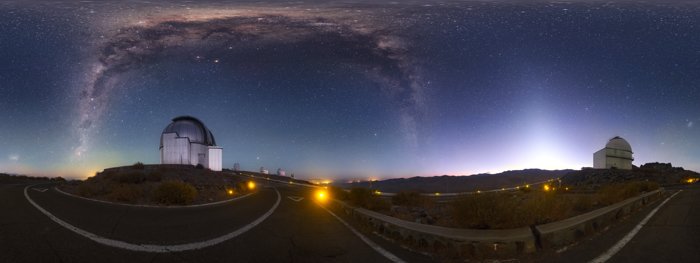A spectacle over La Silla
The arrival of daylight at ESO’s La Silla Observatory reveals the splendour of the Universe beyond our little planet in dazzling detail. The Milky Way stretches overhead as a streaming banner of dust backlit by the light of billions of stars. Clouds of interstellar dust grow thickest towards the constellation of Sagittarius (The Archer), which marks the centre of the galaxy — the core around which the spectacular spiral arms rotate. The Galactic Centre also houses a supermassive black hole that produces huge amounts of energy as it consumes its surroundings (Sagittarius A*).
ESO’s telescopes helped to characterise this monstrous black hole. An almost three-decade-long study used several of ESO’s flagship telescopes — including one of the Very Large Telescope’s 8.2-metre Unit Telescopes (Yepun) situated at ESO’s Paranal Observatory, and the 3.5-metre New Technology Telescope (NTT) at La Silla — to track the motions of stars orbiting the centre of the Milky Way. These observations revealed much about the region, including its distance from Earth, and indicated that it contained an object some four million times more massive than the Sun.
This is not the only incredible discovery to come out of La Silla. Telescopes at the observatory have provided proof that long gamma-ray bursts are linked to the ultimate explosion of massive stars, contributed to the discovery of the accelerating expansion of the Universe, and found a potentially habitable exoplanet around the nearest star to Earth, Proxima Centauri.
Links
Źródło:P. Horálek/ESO
O zdjęciu
| Identyfikator: | potw2018a |
| Typ: | Fotograficzny |
| Data publikacji: | 4 maja 2020 06:00 |
| Rozmiar: | 23284 x 8747 px |
| Field of View: | 360° x 135.2° |
O obiekcie
| Nazwa: | La Silla, Milky Way |
| Typ: | Unspecified : Technology : Observatory |
| Kategoria: | 360 Panorama La Silla |
